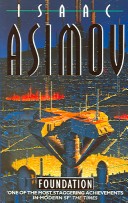Reviewed by celinenyx on
Foundation is the second book I read by Isaac Asimov, I, Robot being the first. Again, this book seems to consist more of a series of connected short stories rather than one complete novel. Each story features a different set of characters in a different time, and often, a different place.
Asimov brings some pretty awesome ideas to the table - one of Foundation's main themes is that of psychohistory, which basically allows people to predict the future of large masses of people through mathematics. What I like about this "science" is that it's something plausible. This is basically what both psychology and economics attempt to do - to predict behaviour. In reality psychohistory is impossible because of the insane number of variables, but as a part of science-fiction I can definitely appreciate this invention.
Where I, Robot was more concerned with humanity, Foundation seems to point out how human history in many ways is cyclical. The collapse of the Galactic Empire brings the Roman Empire to mind, and the parallels between the role of Foundation in reducing the length of the "dark ages" after the collapse are clearly inspired by European history. On an intellectually historic, sociologic, and scientific level, Foundation offers a lot of food for thought, once one digs behind the surface of the story.
I have one problem with Asimov though.
Dude.
Why is there only one named female character in the entire book?
I have a certain level of understanding concerning books that have been written in earlier times. I don't expect them to espouse feminist ideals. I don't even expect the ladies in them to be equal to the male characters, because I know that in certain times, men and women were designated to other "spheres". But truly, I find it inexcusable the way Asimov's world is a fully masculine world, without a single woman that is actually part of the plot. The aforementioned named female is only used as comic relief, and rather poorly chosen comic relief as well.
Apart from the irrational lack of females, Asimov just does not write well-rounded characters. They do all sound exactly the same. I simply have a hard time truly liking a book that features more than eight undistinguishable male characters. They're mouth pieces for his ideas, and nothing more.
Asimov's ideas are great, but his storytelling is lacking in many ways.
Reading updates
- Started reading
- 7 September, 2015: Finished reading
- 7 September, 2015: Reviewed
